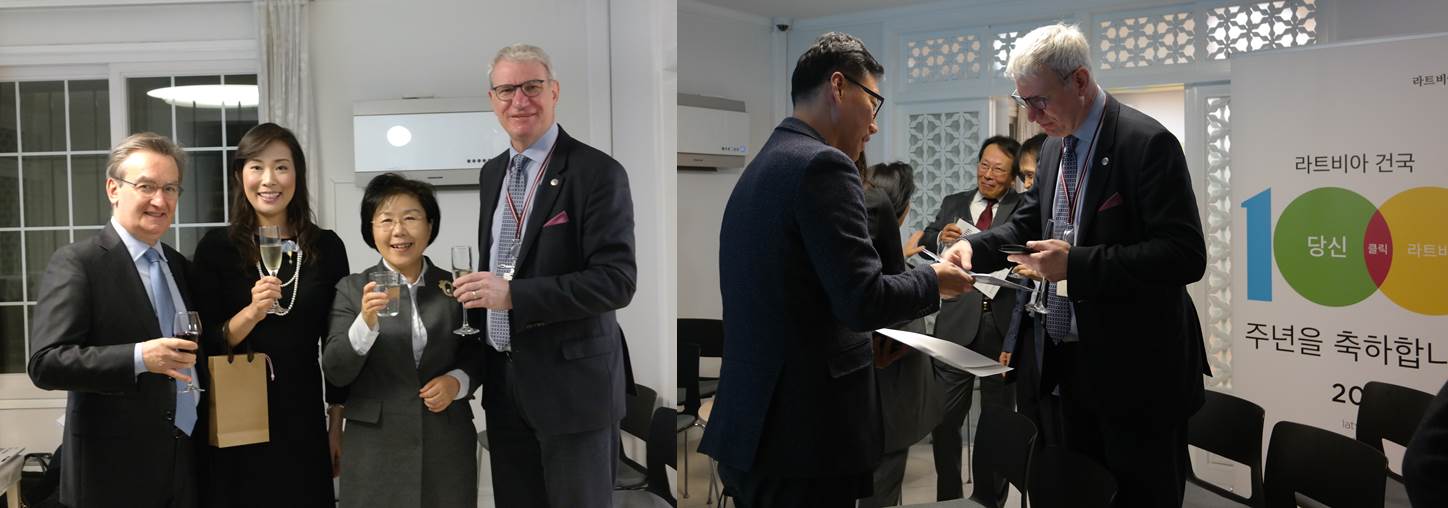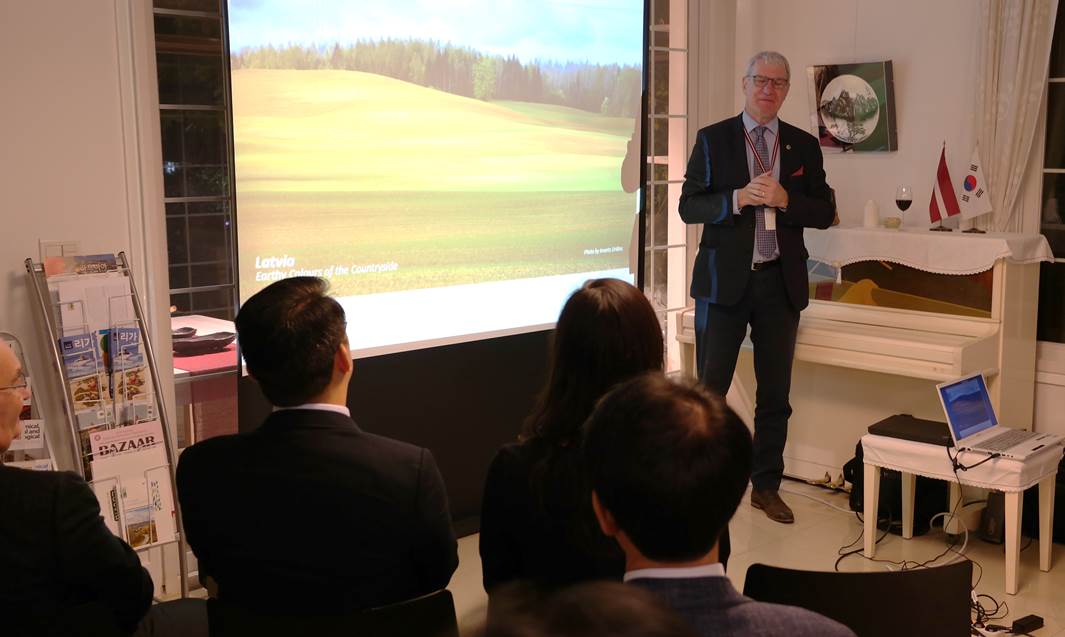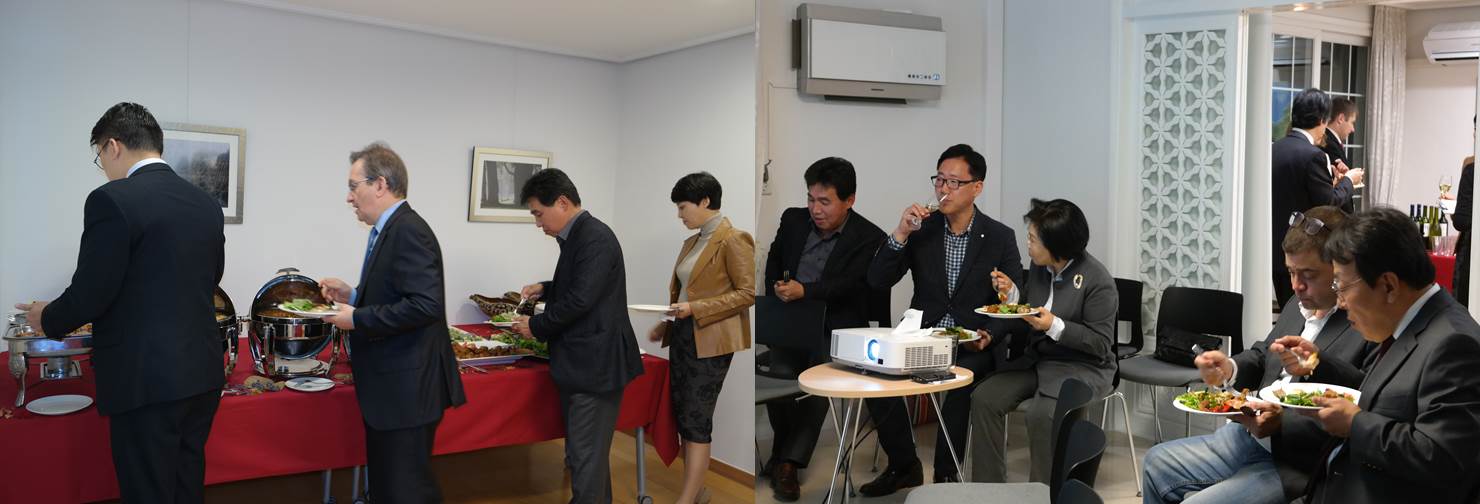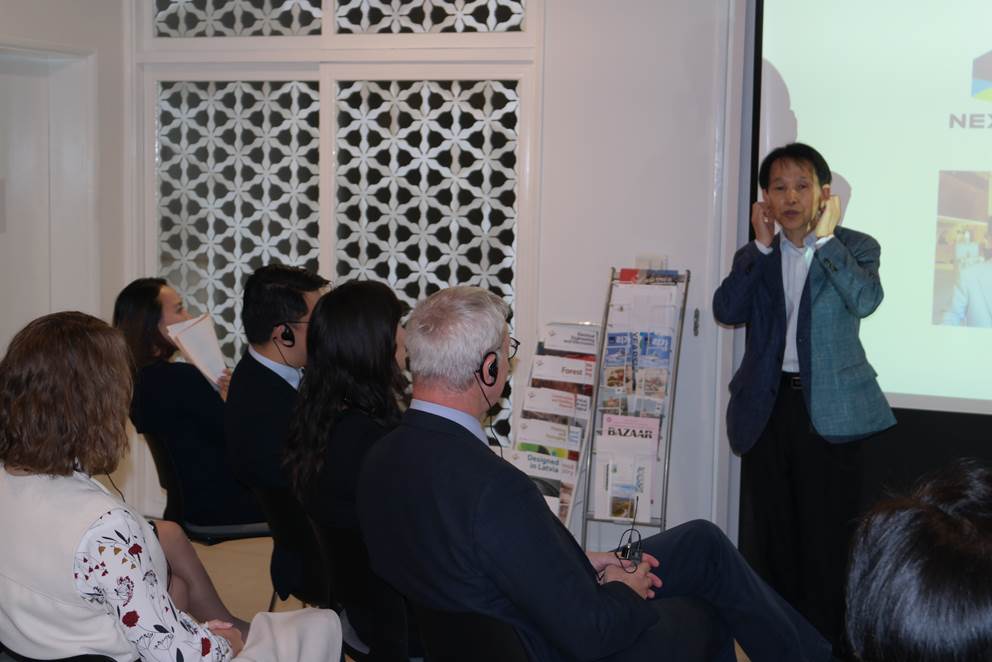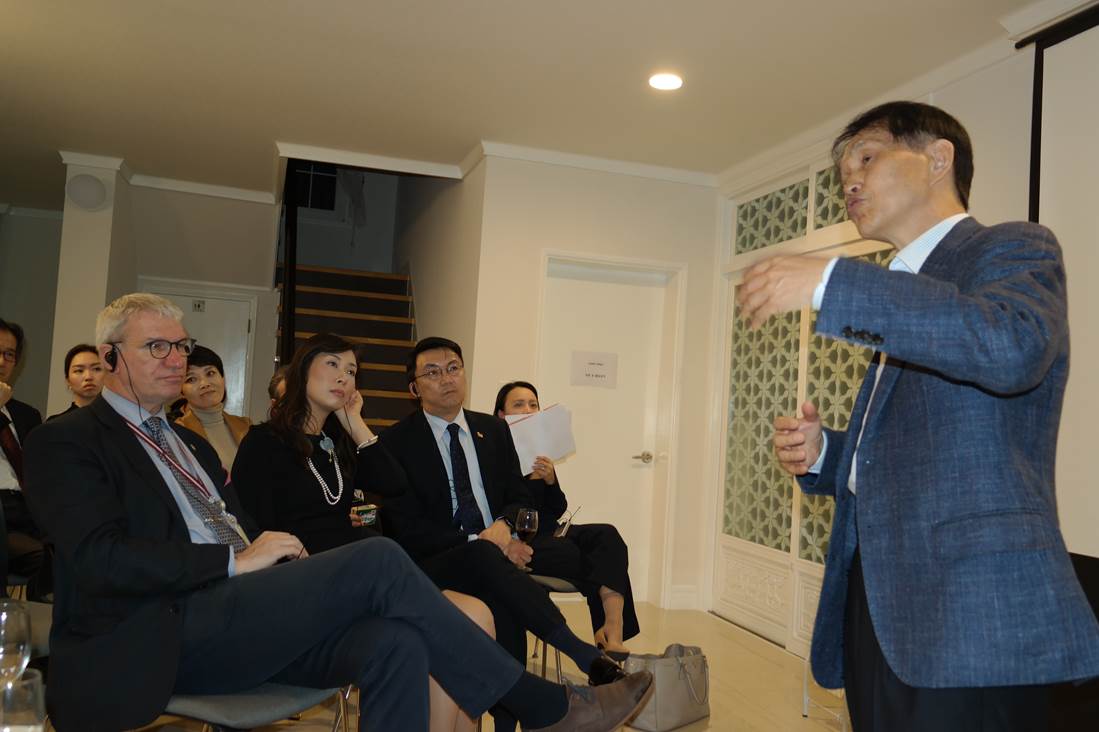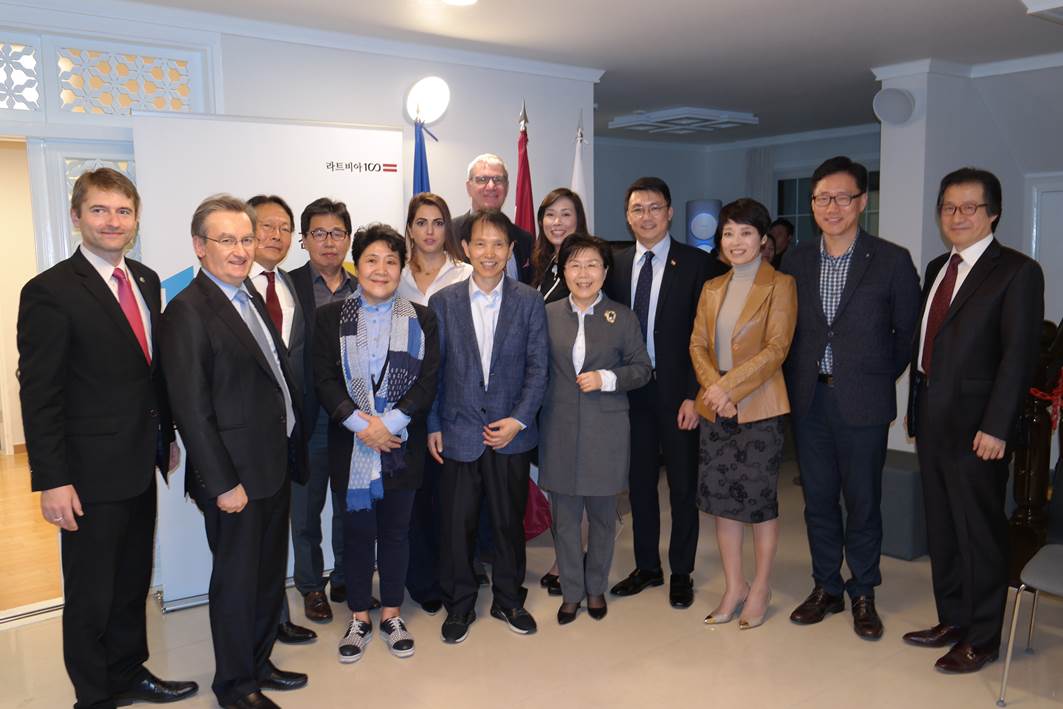
Home > CICI News > What’s New

| Title | Korea CQ - Epilogue of Lecture on ‘3D Creativity & Future Strategy’ | ||||
|---|---|---|---|---|---|
| Posted by | webmaster | Hit | 13195 | Date | 2017.11.09 |
| Files | |||||
Dear Korea CQ members,
H.E. Peteris Vaivars warmly welcomed CQ members with a warm welcoming speech.
Before the lecture, members enjoyed rich and delicious foods of Latvia, specially prepared by Bulgarian chef, Mihal Ashminov.
After dinner, the lecture by Professor Kwang Hyung Lee started. Professor Lee is a professor at the department of Bio and Brain
Engineering, and head of graduate school of Future Strategy of KAIST. His
interests include Intelligence, Bioinformatics, Creativity and Future strategy.
He published more than 100 research papers, and received a merit medal
"Chevalier" from the French government. In the lecture, Professor Lee covered the topics ‘Three
Dimensional Creativity’ and ‘Future Strategy.’ Before we covered the topic of creativity, members learned about the
characteristics of the brain. All activities like memory, habit and playing are made by neural
circuits in the brain, and the repetition of neural circuits makes habit. Compliments stimulate the dopamine area in brain, and the dopamine encourages repetition.
Professor Lee emphasized that asking many questions can cultivate
creativity. When we are fixed on reality, new ideas do not come up easily. In
this case, stepping away from reality can bring forth new ideas. Since asking
questions stimulates the brain to release us from reality, repeating such
questions forms the habit of asking many questions, which increases creativity. In this regard, three questions are suggested. (1) Question of Time: When a problem arises, change the time axis
first of all. How would the matter be handled 10 or 20 years from now? (2) Question of Space: Ask yourself some questions on its spatial
elements. How would the matter be handled in another country, such as Latvia or
in Japan? (3) Question of Field: Apply the given problem in a variety of fields. How would the matter be handled in the field of music or electronic engineering?
Professor Lee, as a founding Dean of KAIST Moon Soul Graduates
School of Future Strategy and founder of the Department of Bio and Brain
Engineering of KAIST, has been studying several new topics by gradually
changing the content of the study: from artificial intelligence to bio and
brain research, and to creativity development method, further to future study. Also, he has the habit of watching TV upside down to make new
neural circuits and new ideas in his brain. He said the K-pop singers are a good example of ‘3D creativity’ -
they prepare in the long term, seeing into 10 years in the future, learning new
language and culture in advance so that they can work in foreign countries, and
converge songs, dances and performances in various fields. All members were absorbed in the interesting lecture by Professor Lee,
having an active Q&A time after lecture. Thank you again for your continued support. Sincerely, Korea CQ Nayun Shin
For more picutres, please click the link below. https://photos.app.goo.gl/z9qYGFtmtbsvXuMA3 Q & A
Q. Peteris Vaivars, Latvian Ambassador: Why did you choose to call it the left-hand-law of creativity, and not the ‘right-hand-law’? A. Kwang Hyung Lee, Professor of KAIST: I derived the name from Fleming’s left-hand law. Q. Kwon Ha Ryu, COO of The Joongang Daily: You said that elders who are 80 or older can also improve their learning ability if they make the effort, but is it not fact that people can succumb to diseases such as dementia due to old age? Can this also be overcome with effort? A. Kwang Hyung Lee, Professor of KAIST: We all have muscular and nerve cells in our body, and I think both are the same. For example, muscles develop if you diligently work out at the gym, even if you are 80 years old. This applies to our brain as well – if we continue to use it, we can slow down the aging process. Q. Didier Beltoise, President of Cs: The Korean education system does not do much to bring creativity to students. How do you see Korea’s education culture evolving in the future? Will it change, or will it continue as it is now? A. Kwang Hyung Lee, Professor of KAIST: That is a very difficult question. I believe that the root of the problem is academic elitism, which should be removed from our society. Without removing academic elitism, the lower level education (middle and high school) cannot change. Q. Konul Teymurova, Spouse of Azerbaijani Ambassador: We know that before cell-phones, everyone memorized numbers, but now no one does. Also, these days, due to the internet, we don’t store information. There is always a disconnect because we are sure that we can get it from the internet at any time. How will this affect us in the future? A. Kwang Hyung Lee, Professor of KAIST: This is a great example of our brain’s plasticity and adaptability. Just 10 years ago, people memorized 10 to 20 phone numbers. Now, people know maybe 5 or less. There are also many people who probably can’t drive in Seoul without a navigation system. That is how fast our brain adapts. As such, some functions of the brain will degrade, but other functions will develop. In place of the degraded function, we will carry a ‘Backup Memory’ with us. In the future, there will be computers everywhere that will assist our brain, and the parts in the brain that control ‘decisions, thoughts, and creativity’ will become more important and develop. On the other hand, the part of the brain that controls ‘memory’ will probably degrade. Q. Choi Jungwha, President of CICI: You said that if a person is complimented or has a positive experience, dopamine is released which helps the person think more. Then, are people who come up with groundbreaking ideas that impacts the future usually people who are often complimented and are in general bright and cheerful? A. Kwang Hyung Lee, Professor of KAIST: For example, there are approximately 17 million Jewish people in the world. However, 20% of the Nobel Prizes in science fields are given to Jewish people. This means, thought Jewish people are only 0.2% of the world’s population, 20% of the Nobel Prizes in science fields goes to them. Most believe this is because of their education culture. What do parents usually tell their children when they go to school? Study hard? Do your best? Be polite? Jewish parents tell their children to ask questions. When their children come back from school, they ask ‘what kind of question did you ask today?’ So, students naturally realize that asking questions is good, and form a habit of asking questions. This can be why they receive 20% of the Nobel Prizes. Q. Choi Jungwha, President of CICI: So, you mean it does not have to do with good DNA, but it is acquired? A. Kwang Hyung Lee, Professor of KAIST: I believe it does not have to do with DNA. According to the bible, the Jewish people spread throughout the world 2,000 years ago. 2,000 years is a very long time. Blood cannot be conserved through such a long time. Q. Choi Jungwha, President of CICI: Artificial intelligence is developing rapidly every day. What will become of our jobs? A. Kwang Hyung Lee, Professor of KAIST: AI is already invading many jobs and occupations. Many new jobs are also being made, but many people predict that our society will change and take a new form with possible less to no jobs. So, what will people do then? People will do what computers cannot – creative work. If you program a computer to play go, then the computer will play go very well. However, it will not be able to create and plan a Go Competition. Only people can create contents that move people’s hearts. Q. Yoon Young Kim, President of Woonsan: As I get older, I become more self-conscious about my memory. As you said in the lecture, it is possible to improve memory with habits and training, but in the future, will there also be medicine that improves your memory? A. Kwang Hyung Lee, Professor of KAIST: It is absolutely possible. However, we have not been able to reach that goal yet. In order to prevent memory decline, we must know exactly how the brain functions and works, but there are still too many parts that are unknown. We require further study and research. Q. Yip Wei Kiat, Singaporean Ambassador: There is a lot of research being done on bionics. You talked about how the brain uses electrical signals to send messages. Machines also use electric signals. Is there a possibility in the future, where we can use the human mind to control machines and electronic devices? A. Kwang Hyung Lee, Professor of KAIST: I will first tell you about the current technology in 2017. If a person taking an MRI scan is told to think of an apple, we can find an image of an apple with the MRI machine. If we tell them to think of a pear, again, we can find a picture of the pear with the MRI machine. If we show the person a video, we can extract a blurry, but very similar video from the brain functions shown in the MRI scan. This is 2017. In 50 years, or 100 years – in the 22nd Century, it will be much more developed. The electronic revolution began in 1946 with the invention of the transistor – it is a civilization that is only 60~70 years old. In 60 years, communication will be much more free. Q. Jin Joo Koo, Advisor of Asiana Airlines: If one has a high IQ, which part does it mean is outstanding? A. Kwang Hyung Lee, Professor of KAIST: IQ is comprehensive. These days, rather than IQ, Multiple Intelligence Theory is more supported. Instead of just one quotient ‘IQ,’ people have 8 kinds of intelligence, including music, athletics, and logical thought. The theory also says that humans do not have all 8 intelligence, but just a few of them.
|
|||||











